
Granta is a literary magazine and publisher in the United Kingdom whose mission centres on its "belief in the power and urgency of the story, both in fiction and non-fiction, and the story’s supreme ability to describe, illuminate and make real." In 2007, The Observer stated: "In its blend of memoirs and photojournalism, and in its championing of contemporary realist fiction, Granta has its face pressed firmly against the window, determined to witness the world."
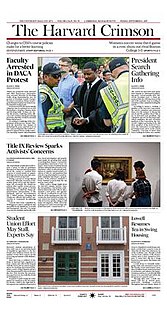
The Harvard Crimson is the daily student newspaper of Harvard University and was founded in 1873. It is the only daily newspaper in Cambridge, Massachusetts, and is run entirely by Harvard College undergraduates. The newspaper is operated by The Trustees of The Harvard Crimson, a nonprofit organization.

Cambridge Students' Union, known as Cambridge SU, is the university-wide representative body for students at the University of Cambridge, England. Its predecessor union was known as Cambridge University Students' Union or CUSU until its dissolution in July 2020.
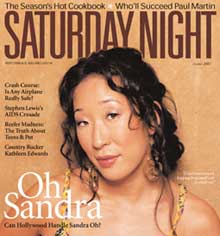
Saturday Night was a Canadian general interest magazine. It was founded in Toronto, Ontario in 1887 and was Canada's oldest general interest magazine. The magazine ceased publication in 2005.

Varsity is the oldest of Cambridge University's main student newspapers. It has been published continuously since 1947 and is one of only three fully independent student newspapers in the UK. It moved back to being a weekly publication in Michaelmas 2015, and is published every Friday during term time.

The Cambridge Student, commonly known as TCS, is one of Cambridge University's student newspapers. The now online only newspaper is owned and published by the Cambridge University Students' Union (CUSU).

The Carillon is the student published newspaper at the University of Regina in Regina, Saskatchewan, Canada. It began publication in 1962 and has a reputation for producing notable journalists. Like many university newspapers, it has had a colourful, precarious existence. Among its many alumni are Canadian broadcaster Norm Bolen and novelist Ken Mitchell.

Cambridge University Liberal Association (CULA) is the student branch of the Liberal Democrats for students at Cambridge University.
The Cambridge University Conservative Association, or CUCA, is a long-established student political society founded 1921, as a Conservative Association for students at Cambridge University, although it has earlier roots in the late nineteenth century. CUCA is not affiliated with the nationwide youth branch of the Conservative Party, the Young Conservatives, but is a fully independent Association distinct from other Conservative youth organisations. The association puts on a range of events for its members each term, notably its ‘Port & Policy’ debates, as well as addresses from a number of high-profile speakers.

The Cambridge University Labour Club (CULC), formerly known as Cambridge Universities Labour Club, is a student political society, first founded as the Cambridge University Fabian Society in 1905, to provide a voice for British Labour Party values of socialism and social democracy at the University of Cambridge. Although the society served only University of Cambridge students for most of its history, in 2007, membership was also opened up to students of Anglia Ruskin. In 2018, with the setting up of a student society for Labour members at Anglia Ruskin, the society reverted to existing for Cambridge University students only. CULC's varied past has seen it go through several disaffiliations with the national Labour Party, including periods in the 1960s and 1970s when it was under the influence of the entryist Militant tendency. It is currently affiliated to the Labour Party and the Cambridge Constituency Labour Party.

Cantab was a magazine produced by students at the University of Cambridge for nearly a decade between 1981 and 1990. It was unusual among British student magazines in being completely independent of student unions. Cantab operations were self-financed, initially through copy sales and advertising, later through advertising alone. The magazine's name, Cantab, is derived from the Latin name for Cambridge and is also short for Cantabrigiensis, the post nominal suffix indicating a degree from the University of Cambridge.
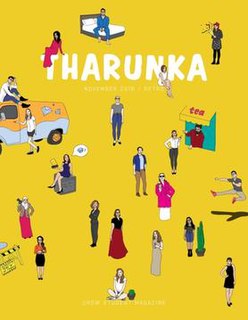
Tharunka is a student magazine published at the University of New South Wales in Sydney, Australia. Established in 1953 at the then New South Wales University of Technology, Tharunka has been published in a variety of forms by various student organisations. At present, Tharunka is published 8 times a year by Arc @ UNSW Limited. The name Tharunka means "message stick" in a Central Australian Aboriginal language.
London Student is a student paper, originally the official student newspaper of the University of London Union. It began publishing in 1979 and was at one point the largest student-run newspaper in Europe. The paper stopped publishing in 2014 after the University of London withdrew funding, but relaunched itself online the following year under a new editorial team. It is now an independent publication with ultimate control over content and appointments vested in the editorial team as a worker co-operative.
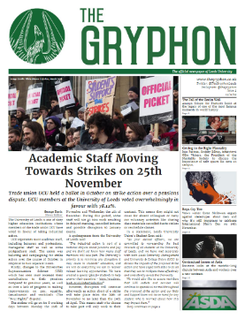
The Gryphon, formerly known as Leeds Student, is a British weekly student newspaper published free every Friday during term-time and distributed around the University of Leeds, Leeds, England. The only paid position is that of the editor, who is elected yearly by members of Leeds University Union. The articles are written by students, and are largely about local and student based issues.
Bathimpact is the student newspaper for the University of Bath Students' Union, England.

The National Intelligencer and Washington Advertiser was a newspaper published in Washington, District of Columbia from October 30, 1800 until 1870. It was the first newspaper published in the District, which was founded in 1790. It was originally a Tri-weekly publication. It covered early debates of the United States Congress. The paper had a strong bias to Republicans and Thomas Jefferson.
The Saint is a newspaper written by students at the University of St Andrews in Scotland. It is one of only a few student newspapers in the UK to enjoy complete financial and editorial independence, as it is not affiliated with the University or Students' Association in any way. It is published fortnightly during term time.
The Journal was an independent, fortnightly, local newspaper originally produced by students at seven major higher and further education institutes in Edinburgh. It was distributed at a number of locations across the city's universities and colleges, as well as at bars and cafés throughout the Scottish capital.
The Clare Market Review is the journal of the LSE Students' Union. It was established in 1905 and is the oldest student-run journal in the UK. It is based at the London School of Economics and published by the university's Students' Union.
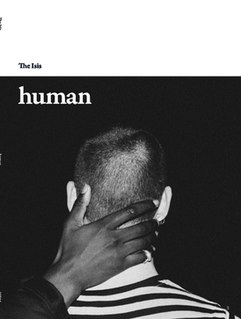
The Isis is a student publication at the University of Oxford, where the magazine was established in 1892. Traditionally a rival to the student newspaper Cherwell, Isis was finally acquired by the latter's publishing house, Oxford Student Publications Limited, in the late 1990s. It now operates as a termly magazine and website, providing an outlet for features journalism, although for most of its life it appeared weekly. The two publications are named after the two rivers in Oxford, "Isis" being the local name for the River Thames.













